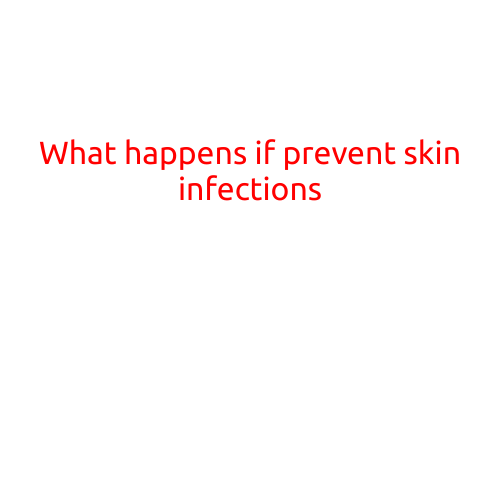
What Happens If You Prevent Skin Infections: A Guide to Healthy Skin
Skin infections are a common problem that can occur anywhere on the body. They can be caused by a variety of factors, including bacteria, viruses, fungi, and even parasites. In this article, we’ll explore what happens if you prevent skin infections and how you can keep your skin healthy and infection-free.
What Are Skin Infections?
Skin infections occur when bacteria, viruses, fungi, or parasites penetrate the skin’s natural barrier and cause inflammation, redness, pus, or other symptoms. There are many types of skin infections, including:
- Bacterial infections, such as impetigo, boil, and cellulitis
- Viral infections, such as warts and herpes simplex
- Fungal infections, such as athlete’s foot and ringworm
- Parasitic infections, such as scabies and pediculosis
Consequences of Skin Infections
If left untreated, skin infections can lead to serious complications, including:
- Spread of infection to other parts of the body
- Increased risk of sepsis, a life-threatening condition
- Scarring and disfigurement
- Increased risk of antibiotic resistance
- Emotional distress and lowered self-esteem
Preventing Skin Infections
Fortunately, many skin infections are preventable with proper hygiene, self-care, and preventative measures. Here are some ways to prevent skin infections:
- Wash Your Hands: Wash your hands regularly with soap and water, especially after using the bathroom, before eating, and after touching animals or their waste.
- Keep Skin Clean and Dry: Clean and dry the affected area regularly, and wear loose, breathable clothing to help prevent moisture buildup.
- Avoid Sharing Personal Items: Avoid sharing personal items, such as towels, razors, and clothing, to prevent the spread of infection.
- Wear Protective Clothing: Wear protective clothing, such as gloves and masks, when working with animals, gardening, or engaging in other activities that increase the risk of skin contact with bacteria or other pathogens.
- Get Vaccinated: Get vaccinated against preventable skin infections, such as warts and herpes simplex.
- Avoid Tight Clothing: Avoid wearing tight clothing, such as tight-fitting socks or tight belts, to prevent moisture buildup and reduce the risk of skin irritation.
- Keep Nails Clean: Keep your fingernails and toenails clean and trimmed to prevent fungal infections.
How to Treat Skin Infections
If you do develop a skin infection, it’s essential to seek medical attention promptly. Your doctor can diagnose and treat the infection with antibiotics, antiviral medication, or antifungal creams or ointments.
In addition to medical treatment, you can take steps to speed up the healing process, including:
- Apply Topical Treatments: Apply topical treatments, such as hydrocortisone cream or antibiotic ointment, as directed by your doctor.
- Keep the Affected Area Clean: Keep the affected area clean and dry to prevent further infection.
- Avoid Scratching: Avoid scratching the affected area, as this can spread the infection and cause further irritation.
Conclusion
Skin infections can be painful, embarrassing, and even serious. By taking steps to prevent skin infections and treating them promptly if they occur, you can enjoy healthy, infection-free skin. By following the tips outlined in this article, you can reduce your risk of developing skin infections and keep your skin healthy and happy.





